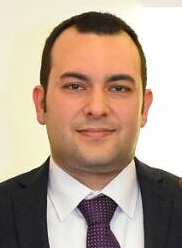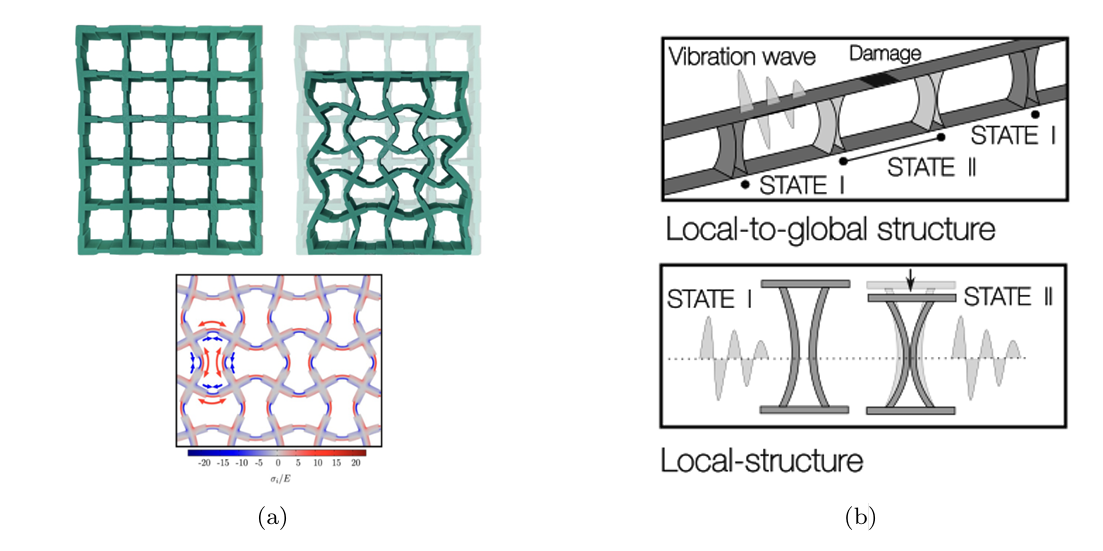
Mechanical Engineering

I am a Lecturer in Mechanical Engineering at the Institute for Materials and Processes in Edinburgh University. My expertise is in the modeling and simulation of particle (granular)/particle-laden systems. These systems are encountered in a broad spectrum of industrial and environmental applications ranging from manufacturing to aerospace industries. To study the multi-physics and multi-scale phenomena encountered in such systems, I develop bespoke parallel numerical schemes and use high-performance computing to discover new physics and to tackle challenging engineering issues.
- BSc, MSc, PhD
- PgDip In Academic Practice
- Member of the Institution of Mechanical Engineers (MIMechE)
- Fellow of Advance HE (FHEA)
- Engineering Thermodynamics (SCEE08006)
Minimum entry qualification- an Honours degree at 2:1 or above (or international equivalent) in a relevant science or engineering discipline, possibly supported by an MSc Degree. Applications are particularly welcome from candidates expecting to receive a first-class degree in mechanical engineering, physics, applied mathematics or a closely related subject.
Further information on English language requirements for EU/Overseas applicants.
Applications are welcomed from self-funded students, or students who are applying for scholarships from the University of Edinburgh or elsewhere as well as sel-funded students.
Competition (EPSRC) funding may be available for an exceptional candidate. Link below for the further details.

This project aims to investigate the capabilities of adaptive structures that change their geometry and mechanical properties to accommodate operational loading and damage management. The core objective of this project is to engineer an adaptive structure that adjusts to the prescribed loading conditions. This adaptation is achieved by integrating local structures that accommodate stiffness variations along the global structure.
The local structures will change their geometry and shape in response to the applied loads, resulting in emergent properties in the main global structure (1). Analytical modeling of the local-structures will provide understanding and control for stiffness tailoring, which will translate into desirable mechanical properties in the main structure. The connection between global properties and local-structure geometry changes aims to be achieved by understanding the relationships between geometric parameters and vibration response.
The geometric nonlinearity induced by the local-structures may cause amplitude-dependent nonlinear dynamic responses (2). Thus, understanding the underlying physics in the coupling between local and global structures, along with the vibration response of the global structure, aims to facilitate feedback to passively control the mechanical properties of the structure. Consequently, this dynamic response leads to continuous shape and geometry modifications within the structure, ultimately enhancing its capacity to accommodate specified loading requirements more effectively. The adaptive structures will benefit operability by maximising structural capacity during service. Interests on: Structural mechanics and dynamics, Stochastic modelling and Uncertainty quantification.
Website: https://dgarciacava.github.io/
Contact: David Garcia Cava (david.garcia@ed.ac.uk)
(1) Sundararaman, V., O’Donnell, M.P., Chenchiah, I.V., Clancy, G. and Weaver, P.M., 2023. Stiffness tailoring in sinusoidal lattice structures through passive topology morphing using contact connections. Materials & Design, 226, p.111649.
(2) Zhao, B., Thomsen, H.R., Pu, X., Fang, S., Lai, Z., Van Damme, B., Bergamini, A., Chatzi, E. and Colombi, A., 2024. A nonlinear damped metamaterial: Wideband attenuation with nonlinear bandgap and modal dissipation. Mechanical Systems and Signal Processing, 208, p.111079.
Minimum entry qualification- an Honours degree at 2:1 or above (or international equivalent) in a relevant science or engineering discipline, possibly supported by an MSc Degree. Applications are particularly welcome from candidates expecting to receive a first-class degree in mechanical engineering, physics, applied mathematics or a closely related subject.
Further information on English language requirements for EU/Overseas applicants.
Applications are welcomed from self-funded students, or students who are applying for scholarships from the University of Edinburgh or elsewhere as well as self-funded students. *Competition (EPSRC) funding may be available for an exceptional candidate but please note you must be a UK student or an EU student who has lived in the UK 3+ years

We invite applications for a PhD position to advance flue gas cleaning technologies from industrial emissions, particularly in Energy-from-Waste (EfW) power plants. The EfW solutions incorporate advanced flue gas cleaning systems that notably reduce landfill waste, lower emissions, generate energy, and assist in material recovery, thus supporting a sustainable closed-loop circular economy. The appointed researcher will contribute to the EPSRC funded M2CLEAN project, which intends to thoroughly investigate the complex dynamics of particle interactions at various scales, including those between solid particles, liquid droplets, and gas phases. The research work will tackle key operational challenges such as regulating temperature and humidity, alongside optimising particle size and distribution to increase emission removal efficiency. The primary goal of this project is to create experimentally informed predictive models that detail these inter-particle interactions, enhancing understanding and efficiency of semi-dry flue gas cleaning systems.
The current Ph.D. position focuses on the experimental investigation of particle-droplet interactions under acoustic levitation. The project aims to foster a new understanding of the spatiotemporal scales and the controlling parameters of particles when subjected to varying temperature and humidity. The project offers hands-on experience in setting up multiphase experiments and using several state-of-the-art optical diagnostics, such as high-speed shadowgraphy, Particle Image Velocimetry (PIV), and Planar-Induced Fluorescence (PLIF).
The ideal candidate will be interested in fluid dynamics, reacting flows, and laser diagnostics and have programming experience in at least one language (e.g., Python, MATLAB, etc.). The selection process considers the comprehensive strength of the entire application, including the academic qualifications, personal statement, CV, and references. Ideally, candidates should have a strong background in fluid dynamics and the development of experimental methodologies.
The project includes close collaboration with TU Darmstadt, Germany and industrial partner Kanadevia INOVA, Zurich, Switzerland. This collaborative environment will offer the opportunity to learn from and contribute to a diverse team of experts.
The intended PhD start date is in beginning of April 2026. If a suitable candidate is found, this position may close earlier than the closing date.
Informal inquiries may be addressed to Dr Khushboo Pandey at kpandey@ed.ac.uk.
Minimum entry qualification - an Honours degree at 2:1 or above (or International equivalent) in a relevant science or engineering discipline. The candidate should have a master’s degree in either Physics or Engineering.
Further information on English language requirements for EU/Overseas applicants.
Tuition Fees and stipend are avilable for Home/EU and International students.
Morphing is a ubiquitous feature in nature: from the growth of plants to embryos evolution to wing adaptation in birds, shape-change is a fundamental aspect of the biological matter itself. What makes this phenomenon compelling is not only its beauty in nature, but its potential to reshape the way we design novel artificial systems, like materials that can adapt to their environment or systems that respond dynamically to external forces. Such possibilities challenge conventional thinking in engineering and design. By studying how stresses, geometry, and material properties interact, we can develop systems that morph with intention rather than by chance. We are inspired by nature, that offers countless inspirations, but the challenge is to translate these elegant mechanisms into technical solutions.
Of particular interest are slender system where the mechanical response and the emerging shape is especially sensitive to the coupling between the mean of actuation and geometry.
The aim of the project is to develop new theoretical frameworks to understand the root causes of active morphing in two-dimensional membrane-like structures and to explore strategies for achieving desired shapes. A key aspect of the work is linking microscopic (discrete) mechanics to macroscopic (continuum) models of active slender systems.
The project involves three main components:
- Theoretical continuum modelling. Extend classical mechanics of two-dimensional bodies by incorporating active effects to study the competition between elasticity and controlled actuation in shaping slender objects.
- Theoretical discrete modelling. Establish quantitative connections between the continuum parameters and the underlying microscopic mechanics.
- Numerical study. Implement the models in computational codes to design and optimize morphing strategies.
During this project, you will be part of the Institute for Infrastructure and Environment. You will join a vibrant community of PhD students, postdoctoral research associates and academics.
Please note that the advert might close sooner, if a suitable candidate is found. Therefore, early applications are advised.
For informal enquiries please contact Dr Matteo Taffetani (matteo.taffetani@ed.ac.uk) and visit https://mtaffetani.github.io/
Minimum entry qualification - an Honours degree at 2:1 or above (or International equivalent) in a relevant science or engineering discipline, possibly supported by an MSc Degree. Further information on English language requirements for EU/Overseas applicants.
This project would potentially suit candidates from backgrounds in Structural and Mechanical Engineering, Engineering Mathematics, Applied Mathematics and Physics.
We are interested to hear from applicants with experience in mathematical modelling and who are keen to develop numerical codes (or improve numerical codes already available) to support the modelling conducted. The applicant should have an interest in applying their studies to experimental evidence gathered from literature or tabletop experiments. Although preferable, knowledge of mechanical concepts (like elasticity or equilibrium equations) is not essential. Familiarity with biological and active systems is not essential.
Tuition fees + stipend are available for Home/EU and International students.
Are you eager to push the frontiers of fluid dynamics and AI to tackle real-world challenges in crowd safety, urban planning, and event management? Join our EPSRC-funded project FLOCKS (Fluid dynamics-Like Open-source Crowd Knowledge-driven Simulator) as a PhD student and help shape the future of crowd modelling.
FLOCKS aims to develop the world's first real-time, open-source simulator of large, dense crowd dynamics for both academic and industrial applications.
Your research will focus on creating a continuum-based fluid dynamics model of human crowds, treating them as "thinking fluids" and using coarse-grained observables, such as density, mean velocity, and stress-like quantities, as descriptors. Drawing on active matter modelling, you will explore ways of incorporating the non-local perception and decision-making of pedestrians into constitutive relationships and boundary conditions with the aim of capturing realistic crowd behaviour. Where possible, you will also explore coupling the crowd model with hazards such as the spread of smoke and fire during incidents, contagion in pandemics, or violence in demonstrations, which will enable a multi-risk approach to assessment and decision support in high-stakes scenarios.
You will work closely with a postdoctoral researcher to develop complementary data-driven approaches that use machine learning to inform, parameterise and validate crowd dynamics models. This collaboration will establish a continuous feedback loop to refine your model and provide valuable opportunities for knowledge exchange.
You will implement the final model in an open-source simulation environment, and your final demonstrator will simulate iconic Edinburgh events (e.g. Hogmanay on Princes Street, an Edinburgh derby football match, or a Murrayfield Stadium concert) using pre-captured datasets to showcase the predictive capabilities of the simulator.
Thanks to our partnerships with world-leading experts in crowd safety engineering and open-source software development, your work will directly impact public safety, urban planning and event management in the real world.
It is intended that the PhD start date will be 1 September 2026, and applicants should select that entry point when applying to the PhD programme.
Minimum entry qualification
- First or Upper Second-Class (2:1) honours degree or equivalent in Engineering, Physics, Applied Mathematics or a clearly related area, with a focus on continuum mechanics, differential equations, and numerical methods or a closely related area.
- Evidence of research in computational engineering, with a specific focus on hydrodynamic modelling of complex systems or a closely related area.
- Proficiency in scientific programming (e.g., Python, Fortran, C++).
Further information on University’s English language requirements for EU/Overseas applicants.
Desirable criteria
- Training in machine learning, ideally applied to model discovery and physics-informed approaches.
- Experience of computational fluid dynamics or agent-based simulation software.
Further information and other funding options.
School of Engineering stipend for 3.5 years, home or overseas fees, £5k research costs (over the duration of the project). The stipend rate for academic year 2025/26 is £21,935.

